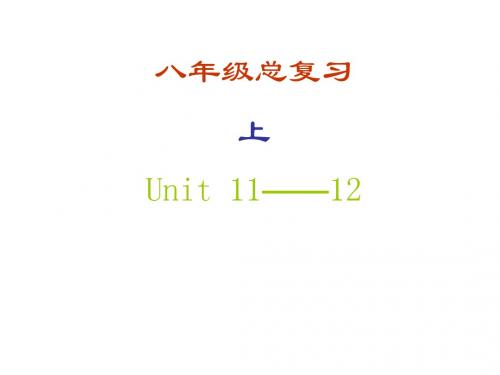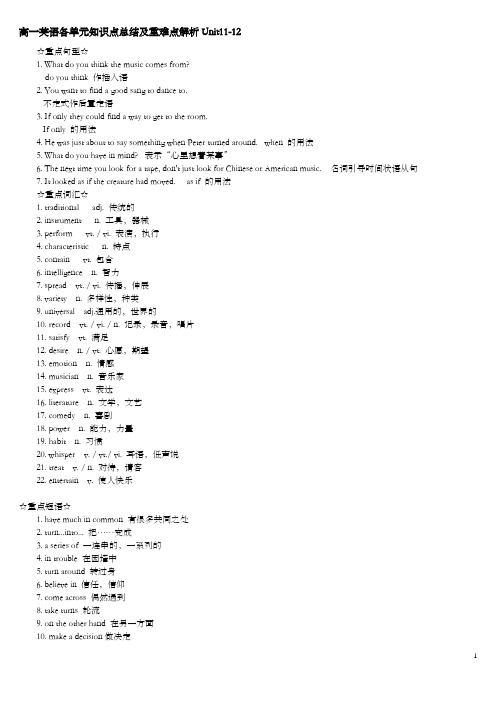Unit 11-Unit12语法要点
英语教材知识梳理九年级全册:Units11-12

◆用作连词:“是 A 而不是 B”;“ 要A 不要 B”;“宁愿 A 而不愿 B”。 可作连词词组使用,连接两个并列成分,表 示在两者中间进行选择。连词前后所跟词的形
式是一致的。
Jack ran rather than walked. 杰克不是在走 而是在跑。 It was what he meant rather than what he
喜欢直播还是录音?
考点三 Sad movies make me cry. 苦情剧让我哭了。 (Unit 11 P81) 【用法归纳】make的用法 ◆“ make +名词 / 代词+形容词或形容词短语” 意为 “使某人/某事(变得)„„”。
We must make the rivers clean.我们必须净化
said. 这是他的意思,而不是他说的话。
◆ 用 作 介 词 :“ 而 不 ” ; “ 不 是 „„( 而
是 )”;“与其„„( 不如 )”;可接动名词 作宾语。 I decided to write a check rather than using the last of my cash. 我决定开张支票而 不把现金用光。
河水。
The news that our team had won made us very happy.我们队赢了的消息使我们大家非常高兴。
◆“make+名词/代词+do sth.(不带to的不定
式)”意为 “使某人做某事”。
What makes the grass grow?什么东西使得草生长? Our teacher makes us feel more confident.老师使 得我们感到更自信了。
Everything is lively here. 这儿的一切都生机勃勃。
八年级总复习上Unit11-12

Unit Twelve What’s the best radio station? 一、重点词、词组、短语、句子: 1.make / do a survey of…做……调查 eg: We made a survey of our students yesterday. 2. My home is close to my school. 我家靠近我的学校。 3.The movie lasted three hours.这部电影持续了3个小时。 4.I have enough time to do my homework. 我有足够的时间做作业。 5.What’s the best radio station? 最好的电台是哪个? 6.It has the friendliest service.它拥有最友好的服务。 7.What do young people think about places in town? 年轻人对城里的地方是怎么想的? st week’s talent show was a great success. 上周的才艺表演取得极大的成功。 9.He danced without music.他跳舞没有音乐 10.The price of a hotel room is about 320 yuan a night. 一间宾馆房间的价格是每晚320元。 11.Harbin is in the north of China.哈尔滨在中国北部。 12.It’s cold in winter, sometimes-30C.冬季很冷,有时零下30C。 13.Hotels usually cut their prices in winter. 旅馆常在冬季降价。
10.invite sb. to + 地方 邀请某人去某个地方 eg: Please invite him to my home. 请邀请他到我家。 11.invite sb. to do sth. 邀请某人做某事 eg: We invited them to dance. 我们请他们跳舞。 12.Wei Hua got a ride to work yesterday. 昨天魏华搭车去上班。 13.Uncle Wang works on teaching.王叔叔从事教书工作。 14.Do you do the laundry by yourself ? 你自己洗衣服吗? 15.Xiao Li hates making dinner.小刘讨厌做饭。 16.We must take care of our parents.我们必须照顾我们的父母。 17.Could you please take out the trash? 你把垃圾拿出去好吗? 18.I need to eat breakfast.我需要吃早饭。 19.I don’t like doing dishes. Because it’s boring. 我不喜欢洗餐具,因为它无聊。 20.I have some favors to ask you. 我有些事要你们帮忙。 二、语法 1.Could you please clean your room?
人教版七年级下册英语11、12单元知识点总结

人教版七年级下册英语11、12单元知识点总结第一篇:人教版七年级下册英语11、12单元知识点总结Unit 11 How was your schooltrip?一、短语归纳1.go for a walk去散步k a cow 挤牛奶3.ride a horse 骑马4.feed chickens 喂小鸡5.talk with与…谈话6.take photos拍照7.quite a lot相当多8.show...around带领...参观9.learn about 了解10.from...to...从...到...11.grow/pick strawberries 种植/采草莓12.in the countryside在乡下 13.go fishing去钓鱼 14.at night 在夜晚15.a lot of许多;大量e out出来17.goona school trip去学校郊游 18.alongtheway沿线19.after that之后20.buy sth.for sb.为某人买某物 21.all in all 总的来说22.take a / the train 乘火车23.be interested in 对……感兴趣24.not… at all 根本不……二、重要句型1.How was your school trip?How + be + 主语?= What be +主语 + like?意为“……怎么样?”答语:It was great./ It was OK./ It was /wasn’t good.2.quiet a lot of+可数名词(复数)/不可数名词,也可单独使用。
e.g.We drank quite a lot of milk.I saw quite a lot of cows.I play tennis quite a lot in the summer.1)quite a little +不可数名词,意为“相当多”;e.g.There is quite a little water in the bottle.2)quite a few 相当多+可数名词,意为“相当多”。
高一英语知识点总结及难点解析Unit11-12

高一英语各单元知识点总结及重难点解析Unit11-12☆重点句型☆1. What do you think the music comes from?do you think 作插入语2. You want to find a good sang to dance to.不定式作后臵定语3. If only they could find a way to get to the room.If only 的用法4. He was just about to say something when Peter turned around. when 的用法5. What do you have in mind? 表示“心里想着某事”6. The next time you look for a tape, don't just look for Chinese or American music. 名词引导时间状语从句7. It looked as if the creature had moved. as if 的用法☆重点词汇☆1. traditional adj. 传统的2. instrument n. 工具,器械3. perform vt. / vi. 表演,执行4. characteristic n. 特点5. contain vt. 包含6. intelligence n. 智力7. spread vt. / vi. 传播,伸展8. variety n. 多样性,种类9. universal adj.通用的,世界的10. record vt. / vi. / n. 记录,录音,唱片11. satisfy vt. 满足12. desire n. / vt. 心愿,期望13. emotion n. 情感14. musician n. 音乐家15. express vt. 表达16. literature n. 文学,文艺17. comedy n. 喜剧18. power n. 能力,力量19. habit n. 习惯20. whisper v. / vt./ vi. 耳语,低声说21. treat v. / n. 对待,请客22. entertain v. 使人快乐☆重点短语☆1. have much in common 有很多共同之处2. turn...into... 把……变成3. a series of 一连串的,一系列的4. in trouble 在困境中5. turn around 转过身6. believe in 信任,信仰7. come across 偶然遇到8. take turns 轮流9. on the other hand 在另一方面10. make a decision做决定11. make fun of 取笑12. think well of 高度评价13. be similar to 与……相似14. compare...with...把……和……比较15. make suggestions 提出建议16. the latest style 最新的式样17. make money 赚钱18. dance to 和着……的节奏跳舞19. be satisfied with 对……感到满意20. pick up 捡起,接收21. make a record 制作唱片22. play a trick on sb. 捉弄某人短语闯关下列短语都是这两个单元学过的重要短语,请你根据汉语在横线上填入一个正确的词,每个词5分,80分才能过关,你一定能过关,做好了闯关的准备吗?那么我们就开始吧?1. ____ common 共同(的);共有(的)2. turn...____ 把……变成3. a ____ of 一连串的;一系列;一套4. ____ trouble 处于困境中;有麻烦5. come ____ 偶然遇见,碰上6. believe ____ 信任;信仰;支持,赞成7. turn ____ 转过身;转过来8. ____ a decision 作决定9. ____ easy 感到舒心10. ____ instruments 演奏乐器11. ____ one's inner desire 满足内心的欲望12. ____ an arts festival 举办艺术节13. ____ the same goals 有共同的目标14. get ____ 到达;做完;通过;度过;打通15. ____ sb badly 虐待某人16. ____... with / to 和……作比较17. ____ magic tricks 看魔术18. have... ____ mind想到;想着19. dance ____ music / a song / a tune 按音乐/歌曲/曲调的节拍跳舞20. a world ____ 无数……,大量……,许多……☆交际用语☆1. Why not have another try?2. What/How about going out for a swim this Sunday afte- rnoon?3. In my opinion, you should [ had better wait another ten minute.4. Maybe it would be better to ...5. That's a good idea.6. I'd love to, but ...7. What can you suggest?8. Nothing can stop me from ...9. Well, that's settled.10. Personally, I believe ...☆词汇短语☆【考点2】common 的用法▲ 搭配:①the commons 普通人.老百姓②out of (the) common 不寻常的,特殊的③have nothing in common (with) (与……)没有共同之处【考例2】[2004辽宁] In the early days of the American.West, gun fights were not ____ for the water re— sources, and laws...A. unlawfulB. unacceptableC. unpopularD. uncommon[考查目标]本题考查common 等派生词的用法和词义。
人教版 英语 七年级下册 Units 11-12语法归纳

人教版英语七年级下册Units 11-12语法归纳一、学习目标1. 一般过去时的用法2. 一般过去时的句式3. 一般过去时的标志词4. 一般过去时中动词过去式的构成二、重点、难点一般过去时的句式【语法学习】1. 一般过去时的用法(1)一般过去时表示过去某个时间发生的动作或存在的状态。
(2)一般过去时也表示过去经常或反复发生的动作。
【例句】He was not at home yesterday. 昨天他没在家。
I often practiced the guitar last year. 去年我经常练习吉他。
【考题链接】1. —What did you do yesterday evening?—I _____ my homework.A. doB. didC. doesD. am doing答案:B思路分析:根据问句句意“昨天晚上你做了什么?”可知答语的动作发生在过去,即:昨天晚上,故应用一般过去时态。
浏览各选项可知B项表示过去时态,是do的过去式。
2. The boy often_______ for his tests last year.A. studyB. studiedC. studiesD. studyed答案:B思路分析:句中虽然有often,但不能用一般现在时,因为句末有表示过去的时间状语last year;本句表示过去经常性、习惯性的动作;study的过去式为studied,故选B项。
句意为“去年这男孩经常为测试而学习”。
2. 一般过去时的句式一般过去时有两种谓语动词,一种是系动词be,另一种是实义动词。
(1)主语+was/ were +其他。
(2)主语+实义动词的过去式+其他。
【考点1】含系动词be的否定句、疑问句:(1)否定句:主语+was/were +not +其他.(2)一般疑问句:Was/Were+主语+其他?简略肯定回答:Yes,主语+was/were.简略否定回答:No,主语+wasn’t/weren’t.(3)特殊疑问句:疑问词+一般疑问句?【例句】They weren’t at home last Sunday. 上周日他们没在家。
七年级英语第十一、十二单元句型、知识点

Unit 11 How was your school trip?play the + 乐器play the guitar play with…和某人\物玩耍2.have +三餐have breakferst \lunch \ supper3. study for… clean the room visit sb s tay at homehave a party talk show 4.go to the beach go to the movies go for a walk go to the mountains5.go shopping\do some shopping \go to the shop 买东西6.last weekend\over the weekend 上周末on weekends 每周末7.on +某日+morning\afternoon\evening (或具体的某一天) in + morning\afternoon\evening in+世纪\年\月\季节at +时刻last (next) month\year\week8.what about+n\v-ing\pro n=how about ……呢9. spend the weekend last week 度过上周的周末10.it’s time to do sth=it’s time for sth 该做么的时候了11.look for寻找.....表示过去发生的动作或存在的状态,通常与过去的时间状语连用:yesterday ,last week(month,year), in 1990(1)系动词be的过去时: am(is) →was, are →were陈述句:He was at home yesterday.否定句:He wasn’t at home yesterday.疑问句:Was he at home yesterday? Yes ,he was./No ,he wasn’t.(2)行为动词的一般过去时:陈述句:主语+动词过去式+其它I go to the movie. →I went to the movie.否定句:主语+助动词didn’t+动词原形+其I don’t go to school today. →I didn’t go to school.一般疑问句:Did +主语+动词原形+其它Do you have breakfast? →Did you have breakfast?Yes,I do./No,I don’t. Yes,I did./No,I didn’t.(3)规则动词的过去式变化规则动词不规则变化:见书上表格do →did have →had go →went see →saw read →read get →gotgive →gave sleep →slept eat →ate write →wrote find---found2.W hat’s the date today? It’s …3.What was the date yesterday?It was…What’s the weather like today?It’s …?4.How was your weekend?6.What did she do ?She did her homework7.What did he do last weekend ?He played soccer8..It’s time to go home= It’s time for homeUnit 12 What did you do last weekend?go on vacation go to summer camp stay at homestudy for exams Central Park show sth to sb.help him find his father walk back to…go shoppingthe Palace Museum think of have fun doing sth.bus trip the Great Wall Tian’an Men Square make sb do sth decide to do sth all dayWhere did they go on vacation? They went to New York City.Where did he go on vacation? He stayed at home.Where did she go on vacation? She visited her uncle.2.Did you/he/she/they go to Central Park?Yes, I/he/she/they did. No, I/he/she/they didn’t.3.How were the movies?They were fantastic4.have fun doing something干某事有乐趣=enjoy oneself doing something We have fun learning and speaking English .We enjoy ourselves learning and speaking English . 我们学英语有很多乐趣.5.find sb. doing sth. 发现某人在干某事find sb. do sth. 发现某人干过某事I find him reading the novel (小说). I found him go into the room . 6.corner角落,角,拐角处(了解)in the corner 在角落里(指在建筑物里面)at the corner 在拐角处(指在建筑物外面或道路的拐角)My bike is at the corner .7.be lost 迷路了=get lost , lost (adj.) The girl was lost in the big city . 8.help sb. (to) do sth.=help sb with sth 帮助某人干某事He always helps us learn English9. make sb. do sth. 让/使某人干某事let / have sb. do sth. do前不带toThe movie makes me relaxing . Let the boy do his homework alone .10. feel+ adj. 感到...I feel hungry / tired /happy / excited11. decide to do sth. 决定干某事They decided to go to Hainan on vacation .。
unit 11-12
eg:they got up earlyso thatthey could catch the early bus.
I raise my voiceso thatI can make myself heard.
尊敬的教师:为使学生快速提高成绩,请您配合我们认真填写教案,以上12项,每缺一项将扣除课时费5元,对于教案完整、丰富、针对性强的老师我们将适当上调课时费。
Unit 11 How was your school trip?
1,一般过去时
基本结构:主语+动词过去式+其他;
否定形式:①was / were + not;②在行为动词前加didn't,同时还原动词;
一般疑问句:①Was/Were+主语+其他?②Did+主语+动词原形+其他?
2,动词过去式规则变化:直接加ed;以不发音e结尾的单词,直接加d;以辅音字母+y结尾的,变y为i加ed;以元音字母+y结尾的,直接加ed;以重读闭音节结尾的,双写最后的辅音字母+ed
12,take sb to…带某人去……
13,put up tents
14,make a fire
15,on the first night
16,each other
17,get a terrible surprise
18,finish doing
19,look out of…从……朝外看(window,door……)
9,并列谓语的时态和数必须一致。
10,In the countryside
11,after that
新人教版七年级英语Unit-11-12单元知识点总结
1. go to the cinema 去看电影 2. go boating 去划船 3. by the lake 在湖边 4. go to the beach 去海滩 5. play badminton 打羽毛球 6. visit my grandma 看望我奶
4. 但是我太累了以致于我早就入 睡了。
携手共进,齐创精品工程
Thank You
世界触手可及
短语归纳
1.go for a walk 去散步 k a cow 挤牛奶 3.ride a horse 骑马 4.feed chickens 喂鸡 5.talk with 和……交谈 6.take photos 拍照
1. show…around 带领……参观 2. in the countryside 在农村 3. go fishing 去钓鱼 4. go to the zoo 去动物园 5. climb the mountains 爬山 6. visit a museum 参观博物馆 7. fire station 消防站 8. draw picture 画画
2. shout at… 冲……大声叫嚷 3. high school 高中,中学 4. fly kites 放风筝、 5. go camping 去野营 6. put up 搭建 7. make a fire 生火
1. tell stories 讲故事 2. each other 互相 3. go to sleep 入睡 4. get a surprise 吃惊 5. shout to… 呼喊……喊叫…… 6. up and down 来来回回;上上下
yesterday evening. 就划线部分提问:What did you do
新概念英语第一册第11-12课重点语法
新概念英语第一册第11-12课重点语法
一、重要句型或语法
1、形容词性物主代词
1)第一人称:my, our
2)第二人称:your, your
3)第三人称:his/her/its, their
2、名词所有格
名词+'s,如:Tim's。
二、课文主要语言点
Whose shirt is that? whose用来提问,是形容词性的,后面一般要跟名词。
但whose也能够直接用作名词性的,如本句话就能够改为:Whose is this shirt?但两者的回答都是:It's ...。
perhaps 表示“也许”,是英语里常用来表示可能性的单词中可能性最低的,所以也经常用来委婉地向别人提建议。
Tim's shirt's white. 该句话连续出现了's的结构,需要提醒学生注意前后的不同。
Yes, sir? 提醒学生注意该句话的语调,要用升调,表示疑问式的应答。
catch 表示“抓住”,但也能够表示“赶上”,如catch a bus。
三、双课补充内容
1、操练句型:Whose is this/that ...? This/That is
my/your/his/her ....。
注意:回答也能够用:It's ...。
2、识记单词blouse/tie等。
3、梳理家庭成员名称:father/mother/brother/sister等。
4、数字:22-31。
unit11-12人教版新课标七年级下册语法
七年级下册英语语法解析与练习(四)一、一般过去时1.定义:一般过去时表示过去某个时间发生的动作或存在的状态,常和表示过去的时间状语连用。
一般过去时也表示过去经常或反复发生的动作。
2.标志:yesterday, this morning, just now(刚才), a moment ago(刚才), ...ago(......以前), last night / year / week(上个......), in the past...3.结构:(1)含be动词的一般过去时的句式:肯定句:主语+was/were+其他否定句:主语+wasn’t/weren’t+其他(2)句中没有be动词的一般过去时的句式:肯定句:主语+动词的过去式否定句:主语+didn’t +动词原形,如:Jim didn’t go home yesterday.一般疑问句:在句首加did,后接动词原形,如:Did Jim go home yesterday?特殊疑问句:⑴疑问词+did+主语+动词原形,如:What did Jim do yesterday?⑵疑问词当主语时:疑问词+动词过去式,如:Who went to home yesterday?4. 动词过去式变化规则:1)一般在动词末尾加-ed,如:pull-pulled, cook-cooked2)结尾是e加d,如:taste-tasted3)末尾只有一个元音字母和一个辅音字母的重读闭音节,应双写末尾的辅音字母,再加-ed,如:stop-stopped4)以“辅音字母+y”结尾的,变y为i,再加-ed,如:study-studied5)不规则动词过去式:(见课本)练习:一、用be动词的适当形式填空。
1. I ______ an English teacher now.2. She _______ happy yesterday.3. They _______ glad to see each other last month.4. Helen and Nancy ________ good friends.5. The little dog _____ two years old this year.6. Look, there ________ lots of grapes here.7. There ________ a sign on the chair on Monday.8. Today _____ the second of June. Yesterday ______ the first of June. It _____ Children’s Day. All the students ______ very excited.二、用所给动词的适当形式填满空白。
- 1、下载文档前请自行甄别文档内容的完整性,平台不提供额外的编辑、内容补充、找答案等附加服务。
- 2、"仅部分预览"的文档,不可在线预览部分如存在完整性等问题,可反馈申请退款(可完整预览的文档不适用该条件!)。
- 3、如文档侵犯您的权益,请联系客服反馈,我们会尽快为您处理(人工客服工作时间:9:00-18:30)。
现在完成时的时间状语
for, since, so far, ever, never, just, up to now, in past years等不确定的时间状语
你玩过电子游戏吗?
Have you ever played a computer game? 你去过西班牙吗?
Have you ever been to Spain? 你梦想过在热带森林里睡觉吗?
“Have you ever…?”句式可以用来谈论 “经历”,句中的谓语动词要用过去分词 书 本P172
现在完成时用来表示之前已发生或完成的动作 或状态,其结果的确和现在有联系。动作或状 态发生在过去 但它的影响现在还存在;也可 表示持续到现在的动作或状态。其构成: have (has) +过去分词。
October, just now, 现在完成时的时间状语,不确定的时间状语
for, since, so far, ever, never, just, yet,till / until, up to now, in past years, always,
我已经完成了我的作业。
I have already finished my homework. 今天我写了两封信。
Have you ever dreamed of sleeping in a tropical forest?你观看过日落吗?
Have you ever watched sunset? 你游览过长城吗?
Have you ever visited the Great Wall?
Unit 12
I have written two letters today. 你去过北京吗?
Have you ever been to Beijing? 火车10分钟前就到了。 The train arrived ten minutes ago. 他昨天傍晚离开这里到广州去了。
He left for Guangzhou yesterday evening. 刘翔已经创造了一项新的世界记录。(set a record)
Unit 11
助动词can,must和should的区别 书本P166 助动词can表示“能,能够”,must表示“必须”;
在否定结构中表示“不许”,一般疑问句的否定回答 用needn’t ,表示“不必”。Should表示“应该” 你会说法语吗? Can you speak French? 他会使用这个软件。 He can use this software.
1)表示经历,常与just, ever, never, before等连用。 I have never been to Beijing. (去过)
Have you ever climbed the mountain? 2)表示之前已发生或完成的动作或状态,其结果的确
和现在有联系,常与just, already, yet, recently, lately 等连用。
He has worked in the school since he graduated from Shanghai Normal School.
一般过去时的时间状语: yesterday, last week,…ago, in1980, in October, just
now, 具体的时间状语
Look at the dark clouds, there is going to be a storm.
用现在进行时表示将来 常用词为 come, go, start, arrive, leave, stay
等。
I'm leaving tomorrow. Are you staying here till next week? We are going to California tomorrow.
I have just had my lunch.
He has already finished his work .
3)动作或状态发生在过去 但它的影响现在还存在; 也可表示持续到现在的动作或状态。常与since, for, in the past three years,等连用。
I have worked here for five years.
news.
Going to与动词原形连用可构成将来时态,表示就要 或打算做某事 书本P168
be going to +不定式,表示将来。 a. 主语的意图,即将做某事。
What are you going to do tomorrow? b. 计划,安排要发生的事。 The play is going to be produced next month。 c. 有迹象要发生的事
天色已晚,你们必须得走了。 It’s late and you must leave. 你应该在这所大学从事研究工作。 You should do research at this university. 他们不该把这个消息告诉她。 They shouldn’t tell her about this piece of
时态复习 书本P186 一般现在时表示经常性、习惯性的动作,现在的特征
或状态或客观存在
现在进行时表示正在发生的动作或即将发生的动作; be going to 用于表示建立的计划或打算
一般过去时表示过去某一时刻的动作,或过去习惯性 的动作
当遇到生词时, 我经常查英语词典。
When I come across a new word, I often consult an English dictionary.
现在完成时与一般过去时的用法比较 书本 P179
现在完成时由have/has+过去分词构成,用来 表示之前已发生或完成的动作或状态,其结果 与现在有联系,也可表示持续到现在的动作或 状态;一般过去时用于描述过去某个去时的时间状语:具体的时间状语 yesterday, last week,…ago, in1980, in
